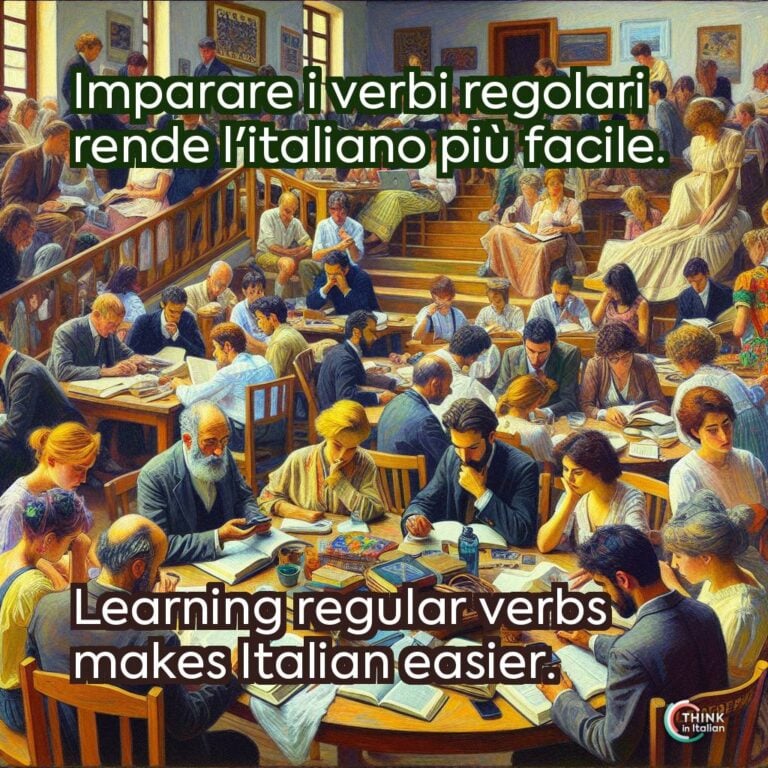Regular Verbs in Italian
Regular verbs, in any language, follow consistent and predictable conjugation patterns. In Italian, regular verbs are divided into three verb conjugations based on their infinitive endings: -are, -ere, and -ire.
How the verb will be conjugated across the various subjects depends on these endings specifically, and their regularity is given by the fact that, unlike irregular verbs, their verbal roots do not change throughout the paradigm.
Regular verbs can be conjugated in all verb tenses while maintaining the same basic structure. This means that once you master the rules for one verb in each family, you’ll be able to conjugate hundreds of others following the same pattern.
As follows, I will provide you with a detailed explanation of each verb conjugation and some examples.
The Three Verbs Conjugations
Verbs Ending in -are
The -are verbs are the largest and most common family in the Italian language. If you’re just starting to learn Italian, this is the perfect place to begin.
An example of first-conjugation regular verb is parlare (to speak):
| Subject | Present | Present Perfect | Imperfect | Future Simple | Condizionale | Congiuntivo Presente | Congiuntivo Imperfetto |
|---|---|---|---|---|---|---|---|
| Io | parlo | ho parlato | parlavo | parlerò | parlerei | parli | parlassi |
| Tu | parli | hai parlato | parlavi | parlerai | parleresti | parli | parlassi |
| Lui/Lei | parla | ha parlato | parlava | parlerà | parlerebbe | parli | parlasse |
| Noi | parliamo | abbiamo parlato | parlavamo | parleremo | parleremmo | parliamo | parlassimo |
| Voi | parlate | avete parlato | parlavate | parlerete | parlereste | parliate | parlaste |
| Loro | parlano | hanno parlato | parlavano | parleranno | parlerebbero | parlino | parlassero |
As you can see, its root – the stem that remains if you get rid of the infinitive -are ending – is consistently always the same throughout all the verb tenses.
Another example is mangiare (to eat):
| Subject | Indicative Present | Present Perfect | Imperfect | Future Simple | Condizionale | Congiuntivo Presente | Congiuntivo Imperfetto |
|---|---|---|---|---|---|---|---|
| Io | mangio | ho mangiato | mangiavo | mangerò | mangerei | mangi | mangiassi |
| Tu | mangi | hai mangiato | mangiavi | mangerai | mangeresti | mangi | mangiassi |
| Lui/Lei | mangia | ha mangiato | mangiava | mangerà | mangerebbe | mangi | mangiasse |
| Noi | mangiamo | abbiamo mangiato | mangiavamo | mangeremo | mangeremmo | mangiamo | mangiassimo |
| Voi | mangiate | avete mangiato | mangiavate | mangerete | mangereste | mangiate | mangiaste |
| Loro | mangiano | hanno mangiato | mangiavano | mangeranno | mangerebbero | mangino | mangiassero |
Verbs Ending in -ere
The -ere verbs are a bit less common than their -are counterparts, but they still make up a large part of Italian vocabulary. These verbs follow a similar, but slightly different, conjugation pattern.
An example of regular -ere verb is scrivere (to write):
| Subject | Indicative Present | Present Perfect | Imperfect | Future Simple | Condizionale | Congiuntivo Presente | Congiuntivo Imperfetto |
|---|---|---|---|---|---|---|---|
| Io | scrivo | ho scritto | scrivevo | scriverò | scriverei | scriva | scrivessi |
| Tu | scrivi | hai scritto | scrivevi | scriverai | scriveresti | scriva | scrivessi |
| Lui/Lei | scrive | ha scritto | scriveva | scriverà | scriverebbe | scriva | scrivesse |
| Noi | scriviamo | abbiamo scritto | scrivevamo | scriveremo | scriveremmo | scriviamo | scrivessimo |
| Voi | scrivete | avete scritto | scrivevate | scriverete | scrivereste | scriviate | scriveste |
| Loro | scrivono | hanno scritto | scrivevano | scriveranno | scriverebbero | scrivano | scrivessero |
You might have noticed that the past participle used in the present perfect is irregular. It is the only irregularity, which is quite common in -ere verbs, just like leggere (to read):
| Subject | Indicative Present | Present Perfect | Imperfect | Future Simple | Condizionale | Congiuntivo Presente | Congiuntivo Imperfetto |
|---|---|---|---|---|---|---|---|
| Io | leggo | ho letto | leggevo | leggerò | leggerei | legga | leggessi |
| Tu | leggi | hai letto | leggevi | leggerai | leggeresti | legga | leggessi |
| Lui/Lei | legge | ha letto | leggeva | leggerà | leggerebbe | legga | leggesse |
| Noi | leggiamo | abbiamo letto | leggevamo | leggeremo | leggeremmo | leggiamo | leggessimo |
| Voi | leggete | avete letto | leggevate | leggerete | leggereste | leggiate | leggeste |
| Loro | leggono | hanno letto | leggevano | leggeranno | leggerebbero | leggano | leggessero |
Verbs Ending in -ire
The third family of regular verbs ends in -ire. In traditional grammar books, these verbs are classified into two groups: regular ones and those that include an additional -isc- in some conjugations.
However, as a linguist, I have a different approach to this. Regularity is given by a statistical prominence of a pattern. Within the third conjugation, 70% of the verbs do include the additional -isc-, meaning that this is the regular form.
The rest does not. Below, I will show you both types, like dormire (to sleep):
| Subject | Indicative Present | Present Perfect | Imperfect | Future Simple | Condizionale | Congiuntivo Presente | Congiuntivo Imperfetto |
|---|---|---|---|---|---|---|---|
| Io | dormo | ho dormito | dormivo | dormirò | dormirei | dorma | dormissi |
| Tu | dormi | hai dormito | dormivi | dormirai | dormiresti | dorma | dormissi |
| Lui/Lei | dorme | ha dormito | dormiva | dormirà | dormirebbe | dorma | dormisse |
| Noi | dormiamo | abbiamo dormito | dormivamo | dormiremo | dormiremmo | dormiamo | dormissimo |
| Voi | dormite | avete dormito | dormivate | dormirete | dormireste | dormiate | dormiste |
| Loro | dormono | hanno dormito | dormivano | dormiranno | dormirebbero | dormano | dormissero |
Just like with the other families, you can see that the verb stem remains unchanged, while the endings shift based on the subject.
Finire (to finish) is an example of –isc- verbs:
| Subject | Indicative Present | Present Perfect | Imperfect | Future Simple | Condizionale | Congiuntivo Presente | Congiuntivo Imperfetto |
|---|---|---|---|---|---|---|---|
| Io | finisco | ho finito | finivo | finirò | finirei | finisca | finissi |
| Tu | finisci | hai finito | finivi | finirai | finiresti | finisca | finissi |
| Lui/Lei | finisce | ha finito | finiva | finirà | finirebbe | finisca | finisse |
| Noi | finiamo | abbiamo finito | finivamo | finiremo | finiremmo | finiamo | finissimo |
| Voi | finite | avete finito | finivate | finirete | finireste | finiate | finiste |
| Loro | finiscono | hanno finito | finivano | finiranno | finirebbero | finiscano | finissero |
Practice Italian Regular Verbs
To truly learn regular Italian verbs, practice is key. The more you practice conjugating these verbs, the more natural it will become. Use them in sentences, practice with a language partner, and write out conjugation tables until the patterns feel automatic.
They are an essential part of learning Italian. Once you grasp the patterns for the three major verb families, you’ll have a powerful tool to express yourself in a wide range of situations.
Keep practicing, and soon enough, conjugating regular verbs will feel like second nature!




